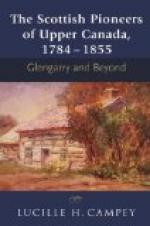On his requesting that they would at least put the woman out of her misery, one of the Indians hastily drew his spear from the place where it was first lodged, and pierced it through her breast near the heart. The love of life, however, even in this most miserable state, was so predominant, that “though this might justly be called the most merciful act that could be done for the poor creature, it seemed to be unwelcome, for, though much exhausted by pain and loss of blood, she made several efforts to ward off the friendly blow."... “My own situation and the terror of my mind at beholding this butchery, cannot easily be conceived, much less described; though I summed up all the fortitude I was master of on the occasion, it was with difficulty that I could refrain from tears; and I am confident that my features must have feelingly expressed how sincerely I was affected at the barbarous scene I then witnessed; even at this hour I cannot reflect on the transactions of that horrid day without shedding tears.”
There were other Eskimo on the opposite shore of the river. Though they took up their arms to defend themselves, they did not attempt to abandon their tents, for they were utterly unacquainted with the nature of firearms; so much so that when the bullets struck the ground, they ran in crowds to see what was sent them, and seemed anxious to examine all the pieces of lead which they found flattened against the rocks. At length one of the Eskimo men was shot in the calf of his leg, which put them in great confusion. They all immediately embarked in their little canoes, and paddled to a shoal in the middle of the river, which being somewhat more than a gunshot from any part of the shore, put them out of the reach of our barbarians.
“When the savages discovered that the surviving Eskimo had gained the shore above-mentioned, the Northern Indians began to plunder the tents of the deceased of all the copper utensils they could find; such as hatchets, bayonets, knives, &c, after which they assembled on the top of an adjacent hill, and, standing all in a cluster, so as to form a solid circle, with their spears erect in the air, gave many shouts of victory, constantly clashing their spears against each other, and frequently calling out tima! tima![6] by way of derision to the poor surviving Eskimo, who were standing on the shoal almost knee deep in water.”
[Footnote 6: “Tima in the Eskimo language is a friendly word similar to what cheer?”—Hearne.]




